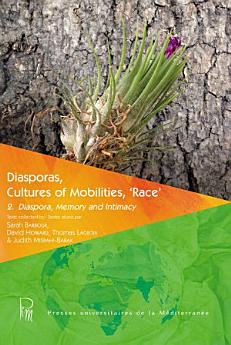Diasporas, Cultures of Mobilities, ‘Race’ 2: Diaspora, Memory and Intimacy
About this ebook
Dans le cadre de la série «Diasporas, Cultures de la mobilité, ‘Race’», ce deuxième volume se propose de compléter les études sur le sujet au travers de regards croisés et interdisciplinaires sur la condition diasporique. Les thèmes du corps, de la mémoire et de l’intime se tissent tout au long du recueil afin d’en révéler et d’en transmettre toute la complexité. Dans le même ordre d’idées, l’impact de la déterritorialisation, inhérent aux phénomènes de migration et relocalisation, est une autre optique majeure dans ce recueil d’essais. Les auteurs s’intéressent aux procédés mémoriels individuels et collectifs internes à l’évolution des communautés de diasporas, par d’étonnantes comparaisons entre diverses régions du monde, états et zones linguistiques. La teneur intellectuelle, la portée critique et la singularité de ce nouveau volume d’essais se reflètent aussi dans les origines géographiques variées de ses contributeurs.
About the author
David Howard is an Associate Professor in Sustainable Urban Development at the University of Oxford and a Fellow of Kellogg College, Oxford. Outwith the University, he is a C.N.R.S. Associate at the Centre Afriques dans le Monde, Université de Bordeaux IV. He has researched in a number of areas relating to the contemporary Caribbean and Latin America, with a specific focus on urban neighbourhoods, social sustainability, migration and development. Recent research projects have centred on urban violence, land rights and housing in Jamaica and the Dominican Republic.
Judith Misrahi-Barak, Associate Professor at Paul-Valéry University Montpellier, France, currently teaches English and Postcolonial Literatures. Her Doctorate was on the Writing of Childhood in Caribbean Literature. She has published articles on Caribbean and Indo-Caribbean writers and the Caribbean and Indian diaspora (Atlantic Studies, Commonwealth, The Journal of Postcolonial Writing, Moving Worlds, The Journal of the Short Story in English, The Journal of Haitian Studies, The Journal of Transnational American Studies... ), as well as book chapters in edited collections, including most recently Littérature et esclavage (S. Moussa, ed. Éditions Desjonquères, 2010); Narrating Nomadism: Tales of Recovery and Resistance (G. N. Devy, G. V. Davis & K. K. Chakravarty, eds. Routledge, 2012); Identité et diversité : créations, discours, représentations (A.-M. Motard, ed. Pulm, 2013); Tracing the New Asian Diaspora (Om Dwivedi, ed. Rodopi, 2014). She has organised several international conferences with invited writers. She is General Editor of the series PoCoPages (Coll. ‘Horizons anglophones’, Presses universitaires de la Méditerranée). She is also Co-Investigator on the AHRC Research Network Series ’Writing, Analysing, Translating Dalit Literature’ (Principal Investigator Dr Nicole Thiara, Nottingham Trent University, UK), 2014–16. http://pays-anglophones.upv.univ-montp3.fr/?page_id=996..
Thomas Lacroix est chercheur au CNRS et membre du laboratoire Migrinter de l’université de Poitiers. Ses travaux portent sur les migrations internationales et plus particulièrement sur les relations entre les migrants et leur pays d’origine. Il est directeur adjoint de la revue Migration Studies aux Presses Universitaires d’Oxford.
Sally Barbour, Professor of Romance Languages at Wake Forest University, teaches courses in French and Francophone language, culture, and cinema, and she regularly teaches African and Caribbean literature in translation. An active member of the Women’s, Gender and Sexuality Studies program, she also currently serves as Program Director of the Interdisciplinary Humanities Program. Her research interests include French and Francophone modern and contemporary narrative in prose and in cinema, and translation studies. She has most recently served as guest editor (with Robert McCormick, Jr. and Sara Steinert-Borella) of Journal of Haitian Studies, Special Issue: Re-Conceiving Hispaniola (University of California, Santa Barbara).







